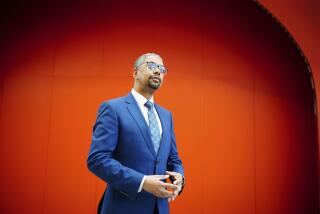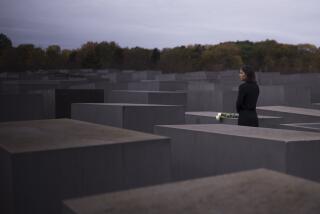Outraged Europeans Take Dimmer View of Diversity
- Share via
LONDON — It was less than genteel, not the kind of thing a Londoner liked to admit, but Matthew Pickard couldn’t help himself when drawn into a discussion about the recent bombings on the city’s transit system. There is an “undertow,” he said, a feeling of resentment toward ethnic communities that had long been welcomed.
“My friends, who are all educated and professionals, they’re saying, ‘What gives those people the right to come up from other countries and set up homes and set up families and then start bombing and maiming people?’ ” the 33-year-old engineering consultant said. “They just don’t move in and integrate with society. They move in and take over. I just think enough’s enough.”
Since the July 7 attacks that killed 52 commuters, an increasing number of Britons have become worried that their nation has been too tolerant of foreigners. Enticed by generous asylum laws, jobs, welfare benefits and a commitment to racial cohesion, millions of immigrants, many from nations once part of the British empire, have found a home here. But their presence is being challenged, especially in the case of people from Muslim cultures.
The frustration and anger in Britain resonate across a continent where deadly attacks in Spain and the Netherlands over the last 18 months have tested faith in multiculturalism. From Rome to Paris to Berlin, governments are rethinking the balance between civil rights and national security, proposing tighter immigration and asylum laws and drafting tougher measures against voices of hate.
Many Europeans’ suspicion of Islam underscores deeper concerns about the failure to integrate ethnic communities that are now seen as spinning away from Western influence. Nations are confronting years of troubled immigration policies that critics say have produced false portraits of social harmony. Cities such as Amsterdam, for example, cast a veneer of tranquillity over smoldering ethnic tensions. Late last year, a Muslim radical with links to a terrorist cell fatally stabbed the Dutch director Theo van Gogh on a city bike path. The killer was apparently angered by a Van Gogh film that was critical of Islam.
The integration question is growing more complex. Many poor immigrant neighborhoods are crowded with the children and grandchildren of people who arrived half a century ago. These immigrants are full-fledged European citizens, holding passports, speaking the languages their parents never mastered and benefiting from generous welfare systems.
But many of them don’t feel welcome. They have sought to define their identity with a defiant brand of globalized Islam, a disturbing dynamic that allows radicals to conceal their intentions in nations they are adept at navigating. Londoners were stunned that three of the four men accused of carrying out the July 7 bombings were born and raised in Britain.
Multiculturalism “was thought to be a source of strength, but it has proved to be a source of rebellion,” said Mufti Abdul Kadir Barkatulla, senior imam of the North Finchley Mosque in North London, once a place of worship for suspects in the failed July 21 copycat attack on the transit system. “Diversity has its economic and cultural strengths. But it has proven, security-wise, it is vulnerable.”
No major European country has found the perfect answer to the question of integration. Britain’s liberal approach urged immigrants to blend in while keeping their distinctive cultural backgrounds. This improved relations but allowed radical clerics to flourish in ethnic neighborhoods. France preferred that its immigrants mute their lineages and adopt all things French, a policy that has contributed to the anger of legions of Muslim men living in slums outside Paris. Germany opened its borders to “guest workers,” most of them Turks, beginning in the 1960s. But the nation didn’t intend for them to stay, creating a cultural limbo in which Germans kept their distance even as the Muslims became citizens and severed ties to their native lands.
Suspicion has widened such divides. Many apprehensive Europeans are taking the view that certain factions of Islam, including radicals seeking a worldwide religious caliphate, are at odds with multiculturalism and the principles of Western democracy.
This was reflected in a Dutch intelligence report following the Van Gogh assassination. The report’s less than politically correct tone reflected the larger Dutch sentiment that the state, which supports affirmative action and funds Muslim schools and Arabic-language TV stations, has been too soft for too long.
Puritanical Islamic groups “want Muslims in the West to reject Western values and standards, propagating extreme isolation from Western society and often intolerance towards other groups in society,” said the December report of the AIVD intelligence service. “They also encourage these Muslims to [covertly] develop parallel structures in society and take the law into their own hands. What they mean is that Muslims in the West should turn their backs on the non-Islamic government and instead set up their own autonomous power structures based on specific interpretation of the Sharia,” or Islamic law.
Many Muslim leaders, however, say Europe has a historical prejudice toward foreigners, especially its Islamic population, which has doubled over the last decade to as much as 15 million. They argue that multiculturalism sounds eloquent but lacks credibility on a continent imbued with nationalism and skeptical of all that is not Christian and white. Germany, for example, has 3 million Muslims in a population of 82 million, but only two of the 601 members of parliament are Muslim. In its capital, Berlin, unemployment among Turks runs at about 45%.
Burhan Kesici, a leader of the Islamic Federation in Berlin, recounted a recent experience during the Islamic holy month of Ramadan to illuminate Europe’s cultural divide. “We were attending a conference on European integration. We couldn’t pray because we didn’t want to interrupt the meeting,” he said. “An imam I was with said to me: ‘How can we Muslims integrate any more than we have already? We didn’t pray when we should have prayed. We didn’t eat right after sunset, and now we’re in an Italian restaurant that serves alcohol.’ ”
Relations had seemed less distant between cultures in Britain, or at least London. Just days before the July 7 bombings, civic leaders had lauded the capital’s “unique multiculturalism” as critical to the city’s winning bid to host the 2012 Olympic Games. The selection was a recognition, said the chairman of the Commission for Racial Equality, “that our capital offers the best real-world answer that humanity has to the challenge of ethnic and religious diversity.”
Many Muslims appeared to agree with the assessment. “The most important popular food now is curry, not fish and chips,” said Ahmed J. Versi, editor of the London-based Muslim News. In 2004, “Mohammed” jumped more than 15 places on the list of Britain’s most popular names for newborn boys, ranking behind Jack, Joshua, Thomas and James.
But by then questions about multiculturalism were being raised, including in the prominent liberal magazine Prospect, which published an essay titled “Too Diverse?” Some Muslim leaders were also worried about rising extremism among Britain’s 1.6 million Muslims, with mosques echoing with fiery anti-Western rhetoric. Ten extremist clerics were arrested recently and targeted for deportation under Prime Minister Tony Blair’s new anti-terrorism measures.
“There was a lax attitude on the part of British authorities to the congregations of extremists here,” said Barkatulla, the imam, who recently took a break from evening prayers and sat in the mosque basement. “They were far too diplomatic.
“England had its own single culture and a very homogeneous society,” Barkatulla said. “And then multiculturalism came with post-World War II. England had such a strong natural identity that it never thought the small pockets of immigrants would cause a problem.... Because of multiethnicity and multiculturalism, the idea of sub-identities was allowed to flourish, and ghettos developed. Locality after locality was lost. They don’t seem to belong to England.”
Such an atmosphere developed throughout much of Europe. Governments such as that of Germany, where ethnic and religious hate produced the Holocaust, wanted to avoid accusations of discrimination and did not aggressively police immigrant neighborhoods. This allowed radical Islam to exist against the stated, but undefined, goal of ethnic unity.
The French are amazed at the British willingness to tolerate ideologues. The French government routinely arrests and deports foreign imams accused of advocating holy war or fomenting ethnic hatred. The practice has intensified at the urging of regional intelligence chiefs, who feel that targeting radicals is a more surgical weapon than politically popular tactics such as cracking down on the Islamic veil, which is banned in public schools.
Despite crime, tension and rising extremism in vast housing projects where the Muslim population tends to concentrate, the French have one of the best security records in Europe. The intelligence division of the national police systematically monitors radical mosques, housing projects, Islamic butcher shops and even travel agencies to keep tabs on suspicious activities, business and foreign travel. Anti-terrorism magistrates have extensive powers enabling them to jail suspects for up to four years pending trial on minimal evidence.
An uneasy Britain now appears to be heading closer to the French model. “Let no one be in any doubt -- the rules of the game are changing,” Blair said in calling for shutting down radical mosques, deporting extremists and outlawing organizations that instigate hate. “Coming to Britain is not a right. And even when people have come here, staying here carries with it a duty.”
On a recent Sunday morning, an elderly British woman who gave her name only as Mum sold carpets in the Brick Lane market, located in a mostly Bangladeshi neighborhood in London’s East End. She and her son had worked on this street for years, watching new faces come, watching things change.
Her assessment: “This country will end up with fire and water, and it won’t work out. Too many of them here.”
She mentioned one of the radical clerics the government wants to deport. “He says he hates England, but he liked the money that’s going with it and the free house. If he doesn’t like England, why doesn’t he go back to where he’s from? I’m not the only one who says that. There are hundreds of people who are saying that.”
Not far away, Mohammed Abdul, a British-born pharmacy school graduate, handed out Islamic literature in the rain, hoping for converts. He said he hadn’t detected any change in the air of gentility surrounding race relations since the July attacks.
“I’m actually proud and quite impressed that this society is so firm in their roots,” he said. “They’ve gone through World War II and have proven themselves unwavering in their stance. They will not be intimidated and start to panic.”
*
Times staff writer Janet Stobart contributed to this report.
More to Read
Sign up for Essential California
The most important California stories and recommendations in your inbox every morning.
You may occasionally receive promotional content from the Los Angeles Times.













